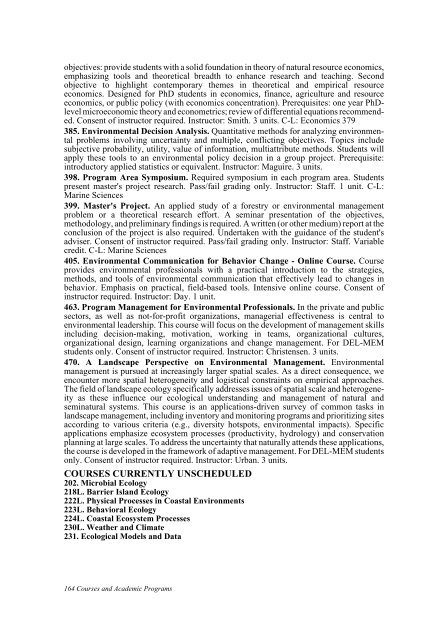2005-06 - Office of the Registrar - Duke University
2005-06 - Office of the Registrar - Duke University
2005-06 - Office of the Registrar - Duke University
You also want an ePaper? Increase the reach of your titles
YUMPU automatically turns print PDFs into web optimized ePapers that Google loves.
objectives: provide students with a solid foundation in <strong>the</strong>ory <strong>of</strong> natural resource economics,<br />
emphasizing tools and <strong>the</strong>oretical breadth to enhance research and teaching. Second<br />
objective to highlight contemporary <strong>the</strong>mes in <strong>the</strong>oretical and empirical resource<br />
economics. Designed for PhD students in economics, finance, agriculture and resource<br />
economics, or public policy (with economics concentration). Prerequisites: one year PhDlevel<br />
microeconomic <strong>the</strong>ory and econometrics; review <strong>of</strong> differential equations recommended.<br />
Consent <strong>of</strong> instructor required. Instructor: Smith. 3 units. C-L: Economics 379<br />
385. Environmental Decision Analysis. Quantitative methods for analyzing environmental<br />
problems involving uncertainty and multiple, conflicting objectives. Topics include<br />
subjective probability, utility, value <strong>of</strong> information, multiattribute methods. Students will<br />
apply <strong>the</strong>se tools to an environmental policy decision in a group project. Prerequisite:<br />
introductory applied statistics or equivalent. Instructor: Maguire. 3 units.<br />
398. Program Area Symposium. Required symposium in each program area. Students<br />
present master's project research. Pass/fail grading only. Instructor: Staff. 1 unit. C-L:<br />
Marine Sciences<br />
399. Master's Project. An applied study <strong>of</strong> a forestry or environmental management<br />
problem or a <strong>the</strong>oretical research effort. A seminar presentation <strong>of</strong> <strong>the</strong> objectives,<br />
methodology, and preliminary findings is required. A written (or o<strong>the</strong>r medium) report at <strong>the</strong><br />
conclusion <strong>of</strong> <strong>the</strong> project is also required. Undertaken with <strong>the</strong> guidance <strong>of</strong> <strong>the</strong> student's<br />
adviser. Consent <strong>of</strong> instructor required. Pass/fail grading only. Instructor: Staff. Variable<br />
credit. C-L: Marine Sciences<br />
405. Environmental Communication for Behavior Change - Online Course. Course<br />
provides environmental pr<strong>of</strong>essionals with a practical introduction to <strong>the</strong> strategies,<br />
methods, and tools <strong>of</strong> environmental communication that effectively lead to changes in<br />
behavior. Emphasis on practical, field-based tools. Intensive online course. Consent <strong>of</strong><br />
instructor required. Instructor: Day. 1 unit.<br />
463. Program Management for Environmental Pr<strong>of</strong>essionals. In <strong>the</strong> private and public<br />
sectors, as well as not-for-pr<strong>of</strong>it organizations, managerial effectiveness is central to<br />
environmental leadership. This course will focus on <strong>the</strong> development <strong>of</strong> management skills<br />
including decision-making, motivation, working in teams, organizational cultures,<br />
organizational design, learning organizations and change management. For DEL-MEM<br />
students only. Consent <strong>of</strong> instructor required. Instructor: Christensen. 3 units.<br />
470. A Landscape Perspective on Environmental Management. Environmental<br />
management is pursued at increasingly larger spatial scales. As a direct consequence, we<br />
encounter more spatial heterogeneity and logistical constraints on empirical approaches.<br />
The field <strong>of</strong> landscape ecology specifically addresses issues <strong>of</strong> spatial scale and heterogeneity<br />
as <strong>the</strong>se influence our ecological understanding and management <strong>of</strong> natural and<br />
seminatural systems. This course is an applications-driven survey <strong>of</strong> common tasks in<br />
landscape management, including inventory and monitoring programs and prioritizing sites<br />
according to various criteria (e.g., diversity hotspots, environmental impacts). Specific<br />
applications emphasize ecosystem processes (productivity, hydrology) and conservation<br />
planning at large scales. To address <strong>the</strong> uncertainty that naturally attends <strong>the</strong>se applications,<br />
<strong>the</strong> course is developed in <strong>the</strong> framework <strong>of</strong> adaptive management. For DEL-MEM students<br />
only. Consent <strong>of</strong> instructor required. Instructor: Urban. 3 units.<br />
COURSES CURRENTLY UNSCHEDULED<br />
202. Microbial Ecology<br />
218L. Barrier Island Ecology<br />
222L. Physical Processes in Coastal Environments<br />
223L. Behavioral Ecology<br />
224L. Coastal Ecosystem Processes<br />
230L. Wea<strong>the</strong>r and Climate<br />
231. Ecological Models and Data<br />
164 Courses and Academic Programs









